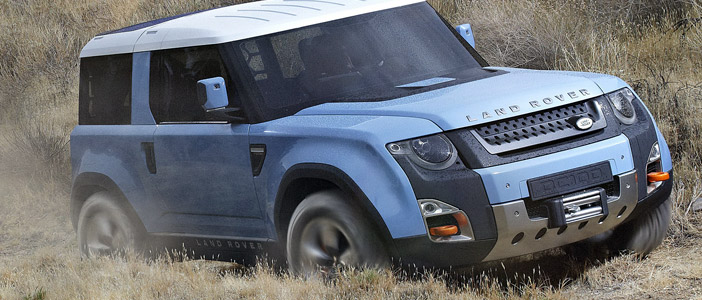Land Rover Defender concepts make North American debut at Los Angeles Auto Show

Land Rover’s DC100 and DC100 Sport concepts investigate the potential design direction for a replacement for the iconic Defender. They will make their North American debut at the 2011 Los Angeles Auto Show on 16th November 2011. Land Rover is taking these concepts to North America to gauge reaction and explore the possibility of bringing the Defender back to the US market.
John Edwards, Land Rover Global Brand Director said: “The Defender has always been at the heart of the Land Rover Brand and single-handedly defines our go-anywhere, can-do sprit. Our ambition is to create an all new Defender for a global market that remains absolutely faithfully to its original DNA: tough, versatile, durable and capable. At the same time, it will be developed for the 21st century and adaptable for the needs of future generations.
Our intention is to introduce the all new Defender in the middle of the decade – there’s a lot of work to do to meet these dates and our concepts are just the start of the journey. We are here in LA to showcase our DC100 and DC100 Sport concepts and start to actively explore the possibility of bringing the future Defender to North America.”
Capturing the rugged, dependable and adventurous spirit of the original, the DC100 concepts are intended to showcase the potential breath of capability for the future Defender family. Evolved since their unveiling at the Frankfurt Motor Show in September 2011, the concepts now ride on optimised off-road 20-inch alloy wheels shod with Cooper all-terrain tyres. The DC100 also features expedition accessories with a raised air-intake ‘snorkel’ for wading and a roof rack.
Finished in the Land Rover signature combination of ‘Heritage Blue’ paint with a Candy Weiss white roof, the DC100 reinvents the essential Defender design cues for the 21st century. These include short overhangs for extreme approach and departure angles, vertical panels, an upright windscreen and strong shoulder line for visibility and ease of positioning and, of course, the honest Defender ‘face’ with its signature round lamps and prominent grille, incorporating a winch.
The DC100 Sport takes all these key design cues and adds to them the spirit of freedom first embodied by the early canvas-roofed Land Rovers with their fold-down windscreens to create a concept bursting with California cool.
Core Land Rover attributes of capability and versatility are underpinned in both concepts by a suite of innovative off-road technological aids that reduce the workload on the driver.
Foremost of these is the next generation of Land Rover’s acclaimed Terrain Response system which will optimise the car for any conditions without driver pre-selection. In addition, a new Terrain-i system creates an intelligent map of the topography in front of the car and displays it as a 3D visualisation. Terrain-i automatically identifies potential hazards and suggests alternative routes. In urban environments the same system is able to identify pedestrians and hazards with great accuracy.
A new Wade Aid system utilises sonar sensors mounted in the bumpers and wing mirrors to measure water depth. As with Terrain Response, Wade Aid will optimise the car for water crossings by closing body vents, raising the ride height, selecting a low gear and advising on the safest speed.
Sustainability has always been a Land Rover hallmark – more than three-quarters of the almost two million Defenders made are still doing regular duty – and the DC100 concepts extend this commitment with new technologies that will reduce their environmental impact. The first is an intelligent Twin-Solenoid Stop/Start system mated to the latest eight-speed automatic gearbox, both of which have been designed with future hybridisation in mind. Second is the unique Driveline Disconnect system, which sends power to the front-axle only unless conditions demand all-wheel drive. Unlike conventional systems, this physically, rather than electronically, decouples the rear-axle to reduce friction losses but can reengage drive almost instantaneously.
